With the promulgation of the Civil Code and judicial interpretations, the revision and promulgation of the Company Law, the Law of the People's Republic of China on the Promotion of the Private Economy and other laws and regulations, the topic of protecting the rights and interests of private entrepreneurs has been brought to the forefront, and the Kyoto Forum on the High-Quality Development of the Private Economy was successfully held in Beijing on September 20, 2010, as part of the 30th anniversary series of activities of Beijing Kyoto Law Firm. As an important part of the 30th anniversary of Beijing King&Capital Law Firm, the forum gathered experts and scholars in the field of law, practitioners in the legal profession and a large number of private entrepreneurs to carry out in-depth discussions on the angle of the rule of law and digital empowerment of the high-quality development of the private economy, with the aim of providing an effective reference program of legal governance, and providing advice for the sound development of enterprises.
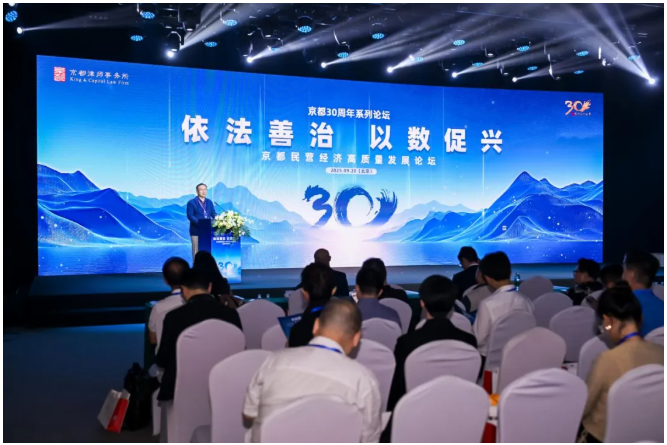
Forum site
On the same day, Tian Wenchang, Honorary President of the Institute of Advanced Criminal Defense of Northwestern University of Political Science and Law and Honorary Director of Beijing King&Capital Law Firm, Sun Xianzhong, Member of the Chinese Academy of Social Sciences, Member of the Standing Committee of the 14th NPC, Member of the Constitutional and Legal Committee of the 13th and 14th NPC, Fu Jianping, President of the Institute of Public Service of the Future City of Xiongan New Area, Zhu Ciyun, Professor of Beijing Academy of Law, and Executive Vice-President of the China Business Law Research Association, and Professor of Beijing Municipal School of Law, and Zhu Ciyun, Professor of Beijing Municipal School of Law. Professor Zhu Ciyun of the School of Law, Chu Changzhi, Managing Partner and CEO of Beijing King&Capital Law Firm, Zhao Qilong and Wang Fei, Senior Partners, and other guests attended the event and delivered speeches. Liu Jiachuan, Wei Qi and Jiang Ning hosted the event.
2025
Penetrating the Legal Perspective and Advising on Corporate Compliance
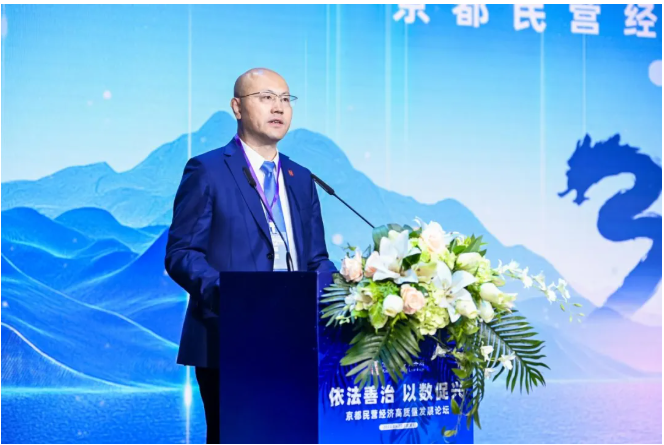
Chu Changzhi
Chu Changzhi, Managing Partner and CEO of Beijing King&Capital Law Firm, introduced in his welcome speech that over the past 30 years, King&Capital Law Firm has developed into China's leading comprehensive legal service organization under the guidance of the “four-pronged policy” of integration, specialization, teamwork and internationalization, and has built up a reputation as a leading provider of legal services in China in the fields of civil and commercial affairs, competition law and intellectual property rights, such as the dispute over liability for securities misrepresentation and the new legal system. In the fields of civil and commercial affairs, competition law, intellectual property rights and other areas, it has created benchmark cases such as Leshi.com's securities misrepresentation liability dispute and New Balance's trademark infringement and unfair competition case. He pointed out that in recent years, the new Company Law and other laws and regulations have been introduced intensively, which not only lay the foundation of the rule of law for the development of the private economy, but also put forward higher compliance requirements, and King&Capital will further utilize the core advantages of its civil and commercial business and continue to assist the sound development of private enterprises.

Tian Wenchang
“The private economy is the main force of the market economy, and the market economy is the economy of the rule of law, so the high-quality development of the market economy can not be separated from the effective and efficient legal protection.” Tian Wenchang, Honorary President of the Advanced Institute of Criminal Defense of Northwestern University of Political Science and Law and Honorary Director of Beijing King&Capital Law Firm, emphasized that the lawyers' community has an incumbent professional obligation and social responsibility for the development of the private economy, and this forum covers macro legal interpretation and micro practical operation, both traditional legal issues and new topics of digital economy, realizing the deep integration of theory and practice, and is expected to provide important intellectual support for the development of the private economy. It is expected to provide important intellectual support for the development of private economy.
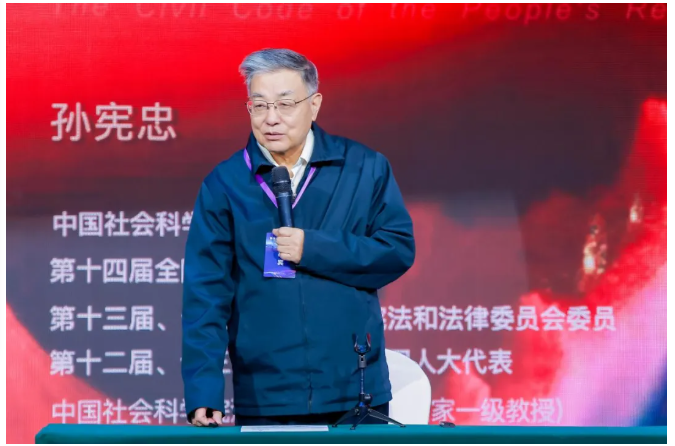
Sun Xianzhong
In the professional sharing session, Professor Sun Xianzhong, member of the Chinese Academy of Social Sciences, focused on the theme of “Reflections on the Guiding Role of the Principle of Systematization of Civil Law in the Analysis and Adjudication of Civil Cases”, and explained the importance of codification in eliminating the fragmentation of the law and realizing the unity of law enforcement and justice by referring to the historical allusion of “Changing Laws Faster Than Changing Horses” in the French Civil Code, and reviewing the importance of the Civil Code. He explained the significance of codification in eliminating legal fragmentation and realizing the unity of law enforcement and justice, and reviewed the codification process of the Civil Code. Combined with judicial practice, he proposed that lawyers should establish systematic thinking, accurately grasp the relationship between the application of general law and special law, and distinguish between core legal concepts such as dominance and claim, claim and property act, mandatory norms and arbitrary norms, etc. He also emphasized that it is necessary to break through the limitations of mechanically applying the law and effectively protect the legitimate rights and interests of the parties by taking the dispute over the registration of immovable property as an example.
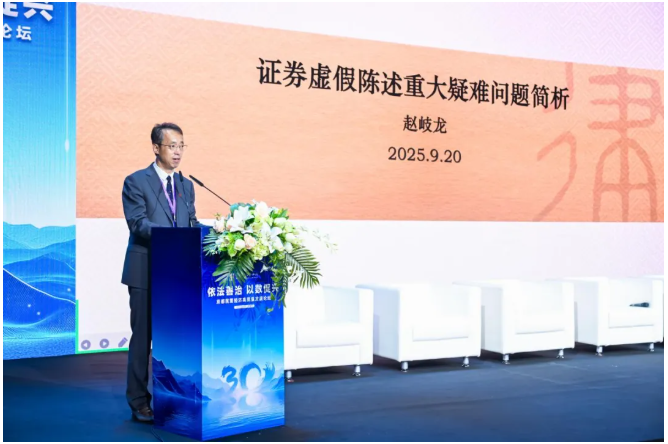
Zhao Qilong
Disputes over securities misrepresentation are a major risk faced by private listed companies. Zhao Qilong, senior partner of Beijing King&Capital Law Firm, analyzed the judicial determination standards of “”three days and one price“”, i.e., the implementation date, the disclosure date, the base date and the base price, in combination with the agency cases of Leshi.com, Kangdexin, etc., clarifying the He also clarified the difficulties in determining the materiality and causality of the misrepresentation. He pointed out that under the new regulatory environment, the responsibilities of the actual controllers, directors and supervisors of listed companies continue to increase, and the obligations of intermediaries as “gatekeepers” continue to be strengthened, which makes it even more necessary for enterprises to establish a whole chain risk prevention and control system.
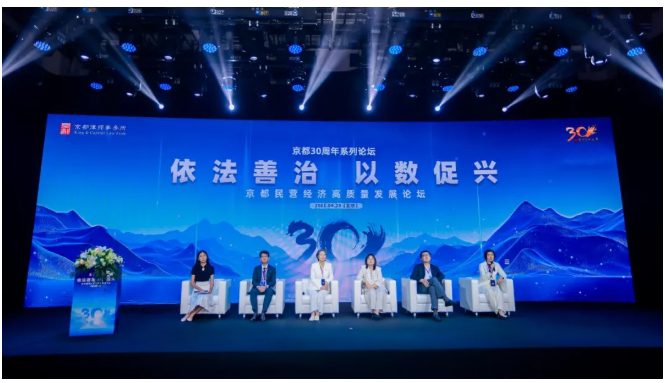
From left: Mr. Liu Jiachuan, Mr. Zhu Yuanxiao, Mr. Guo Wei, Mr. Gao Kun, Mr. Ma Ruofei and Mr. Yuan Yingyan.
In the morning session, five lawyers engaged in an in-depth dialog focusing on the practical points after the implementation of the Civil Code, the new Company Law and other laws and regulations. King&Capital Law Firm attorneys Zhu Yuanxiao, Ma Ruofei, Gao Kun and Yuan Yingyan, and Guo Wei, a senior partner of Yingke Law Firm, made speeches on the validity and responsibility of guarantee provided by the company for others, and the protection of company's interests after signing the contract, etc., and exchanged ideas on the spot.
2025
Focusing on Digital Transformation and Exploring New Paths for Private Economy Development
The afternoon agenda focused on the new path of private economic development in digital transformation.
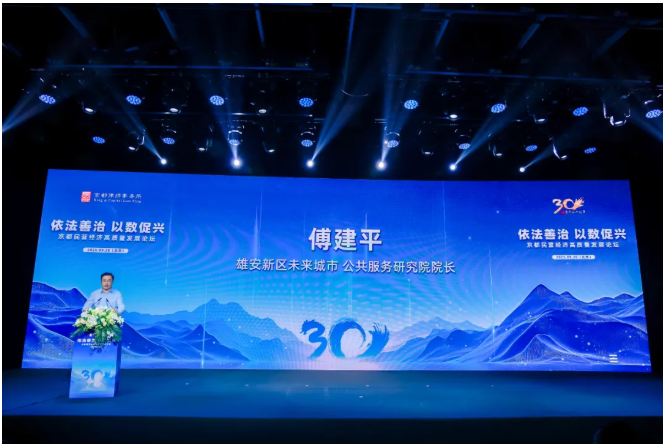
Fu Jianping
Fu Jianping, Director of the Future City Public Service Research Institute of Xiongan New Area, said that digital development has brought very great opportunities to the economy and society, and at the same time, it has also brought great uncertainty. The deep integration of data elements and artificial intelligence has become a new kinetic energy to change the mode of production, promote social progress, and reshape the underlying logic of the future value revolution. In his opinion, the Private Economy Promotion Law establishes the status of data as a production factor for the first time from the legal level, and builds a legal framework of “data factor x private economy”. He suggested that we should take the open development of public data as a precursor, guide large, medium and small enterprises to participate in the construction of the data market, make joint efforts to create a favorable innovation atmosphere and a fair competition environment, and work together to build a data community ecosystem with shared values, balanced interests and shared responsibilities, so as to promote the transformation of data into real productivity, cultivate new quality productivity and promote high-quality development.
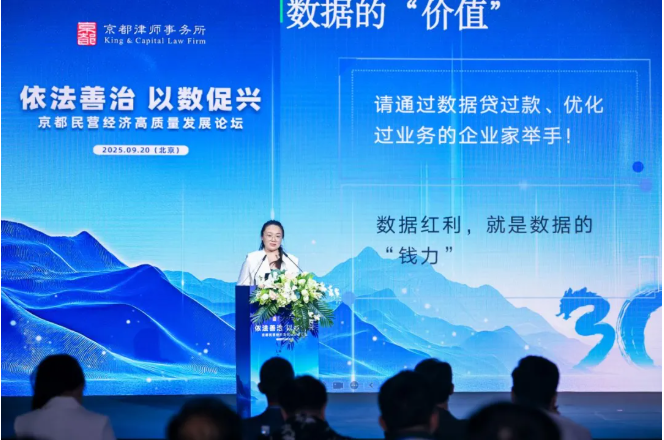
Tapty Lee
Tap Tina Li, Deputy Director of Security Business Department of National Evaluation Organization, analyzed the security and development path of private enterprises under the new trend of data governance from a practical perspective. She pointed out that data is a “digital wallet” that can help enterprises obtain loans and expand orders, but there is also a risk that leakage will lead to high compensation and loss of customers. She emphasized that policy is a “safe navigation”, risk hides opportunities for cooperation, and technology needs to be “prevented while being used”. It is emphasized that policy is “security navigation”, risk hides cooperation opportunities, and technology needs to be “used and prevented”. It is suggested to revitalize legal affairs, technology and internal audit to build a security team, build a system with data classification, division of responsibilities and staff training, use encryption and access control for strong protection, and do compliance according to the study of laws and regulations, frequent self-inspection, and preplanning, and it is also mentioned that data innovation can increase revenue and security cooperation can reduce cost, which can help private enterprises build a strong security defense and grasp the opportunities for development.
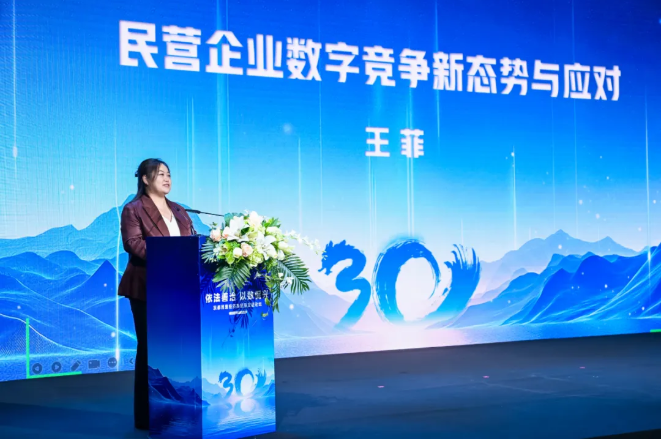
Faye Wang
"With the development of technologies such as artificial intelligence and web 3.0, digital competition must be a major battlefield for future development. Competition rules are continuing to evolve, and regulation will become more normalized and refined. The degree of internationalization of digital competition will also be further deepened." Wang Fei, Senior Partner of Beijing King&Capital Law Firm, analyzed the new type of legal disputes in digital competition by combining typical cases. She proposed that the current digital competition has upgraded from a single infringement dispute to a multi-domain, multi-jurisdictional, multi-dimensional composite game, with issues such as algorithmic collusion, data crawling, and AI model infringement becoming more and more prominent, and that enterprises need to optimize their governance tools, incorporate compliance into the whole process of product projects and cross-border cooperation, and maintain their competitive advantages by means of intellectual property rights protection, chain-wide monitoring, and multi-dimensional governance.
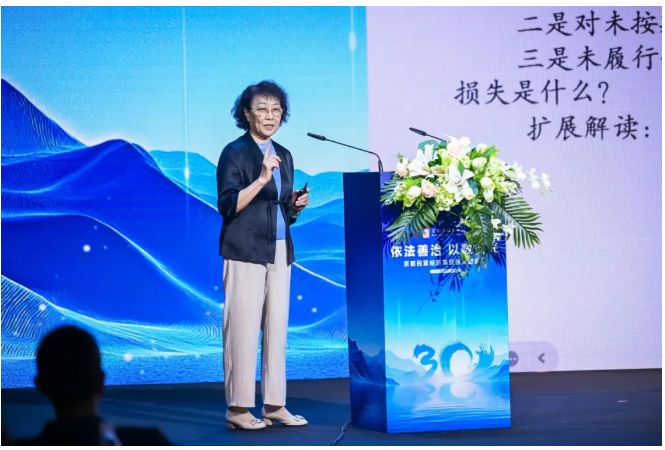
Zhu Ciyun
Zhu Ciyun, a professor at Tsinghua University Law School, systematically explained the restructuring of the directors' liability system, emphasized the directors' obligations of capital verification and fiduciary obligations as “gatekeepers”, and clarified the boundaries of liability in the scenarios of financial subsidies, connected transactions, etc. She especially pointed out that the new law introduces a number of new rules for directors to comply with. In particular, she pointed out that the new law introduces the rules of shadow directors and de facto directors, which provide a legal basis to regulate the abuse of rights by de facto controllers, while the provisions on directors' liability to third parties need to adhere to the principle of supplemental liability to avoid breaking through the system of independent personality of the company.
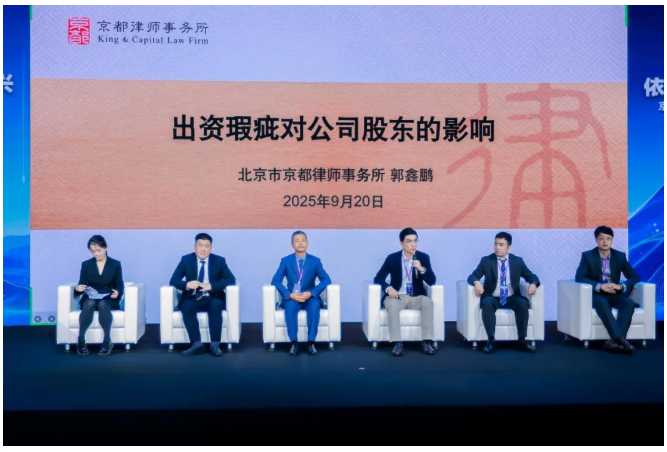
From left: Jiang Ning Gong Piguo Wu Shengkui Guo Xinpeng Wang Xiaoguang Jia Kun
The ensuing panel discussion centered on corporate governance and directors' and supervisors' responsibilities under the new Company Law. Mr. Gong Piguo, senior partner of Beijing King&Capital Law Firm, Mr. Guo Xinpeng, Mr. Wang Xiaoguang, Mr. Jia Kun, lawyers, and Mr. Wu Shengkui, senior partner of Beijing Yida Law Firm, not only compared the differences between the old and the new Company Laws and analyzed the controversy over the application of accelerated expiration system in the old and the new Laws, but also analyzed the reasons for the increase in crimes committed by executives and the responsibility of the shareholders for the history of capital contribution flaws from the criminal perspective, and proposed that enterprises need to prevent criminal risks by standardizing resolution procedures, cleaning up affiliated companies, and establishing modern management concepts.
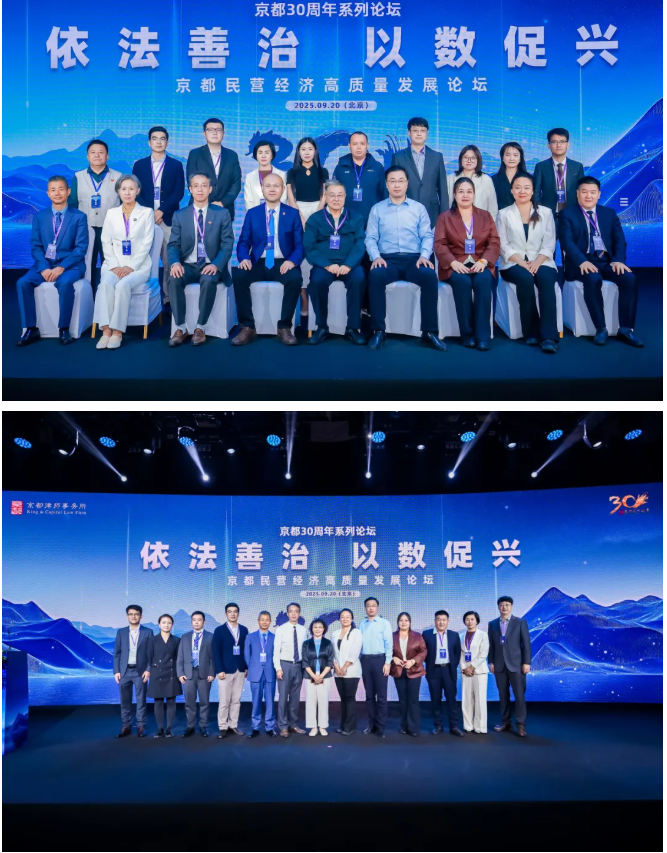
Through multi-dimensional and in-depth discussions, this forum has demonstrated the determination of the judicial sector and private enterprises to work together with the same root and origin, to move in the same direction and to make progress hand in hand, and has clarified the practical path of the rule of law and the digital dual-wheel drive for the development of the private economy, which provides valuable guidelines for the enterprises to comply with the operation, risk prevention and control.






